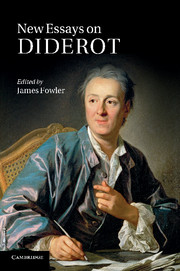Book contents
- Frontmatter
- Contents
- Notes on contributors
- Acknowledgements
- List of abbreviations
- Introduction
- PART I DIDEROT THE PHILOSOPHE
- 1 Diderot and the ancients
- 2 Diderot's earlier philosophical writings
- 3 The Encyclopédie: innovation and legacy
- 4 Diderot, Rousseau and the art of craft
- 5 Diderot's anti-colonialism: a problematic notion
- 6 Diderot's letters to Sophie Volland
- PART II NOVELS
- PART III DIALOGUES
- PART IV PLAYS AND DRAMATIC THEORY
- PART V MUSIC, PERFORMANCE, AESTHETICS
- Select bibliography
- Index
- References
1 - Diderot and the ancients
Published online by Cambridge University Press: 11 April 2011
- Frontmatter
- Contents
- Notes on contributors
- Acknowledgements
- List of abbreviations
- Introduction
- PART I DIDEROT THE PHILOSOPHE
- 1 Diderot and the ancients
- 2 Diderot's earlier philosophical writings
- 3 The Encyclopédie: innovation and legacy
- 4 Diderot, Rousseau and the art of craft
- 5 Diderot's anti-colonialism: a problematic notion
- 6 Diderot's letters to Sophie Volland
- PART II NOVELS
- PART III DIALOGUES
- PART IV PLAYS AND DRAMATIC THEORY
- PART V MUSIC, PERFORMANCE, AESTHETICS
- Select bibliography
- Index
- References
Summary
Diderot seems in many ways to be the most forward-looking, the most ‘modern’, of the eighteenth-century French philosophes. Even his attitude to his works, just as much as the content and form of them, suggests this: although he composed many of what we now regard as his most important works without thought of conventional publication in his lifetime, he nevertheless did so with a keen eye on posterity. He fervently hoped that the future would be as interested in him as he was in it, as he suggests in a letter to the sculptor Étienne-Maurice Falconet in December 1765: ‘En vérité, cette postérité serait une ingrate si elle m'oubliait tout à fait, moi qui me suis tant souvenu d'elle.’ (‘Indeed, posterity would truly be ungrateful if it forgot me completely, given that I have been thinking about it so much.’) But this is only part of the story. For Diderot was just as concerned with the past as he was with the future. Pursuing his epistolary debate with Falconet about posterity, he notes in a letter of February 1766: ‘Plus l'homme remonte en arrière, plus il s'élance en avant, plus il est grand.’ (‘The further a man turns back, the more he launches forward, the greater he is.’) Diderot looks back in order to move forward. In particular he looks back to antiquity and finds in it the springboard for his daring intellectual adventure.
- Type
- Chapter
- Information
- New Essays on Diderot , pp. 13 - 30Publisher: Cambridge University PressPrint publication year: 2011
References
- 2
- Cited by



